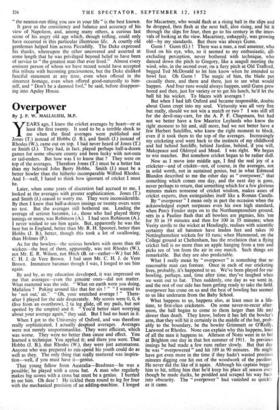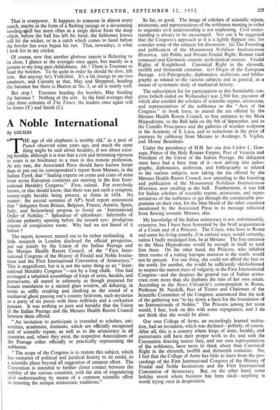Overpower
By J. P. W. MALLALIEU, M.P.
YEARS ago, I knew the cricket averages by heart—or at least the first twenty. It used to be a terrible shock to me when the final averages were published and Jones (T.) instead of Hobbs (J. B.), and Smith (J.) instead of Rhodes (W.), came out on top. I had never heard of Jones (T.) or Smith (J.). They had, in fact, played perhaps half-a-dozen games for some obscure county and been lucky with not-outs or tail-enders. But how was I to know that ? They were on top of the averages. Therefore Jones (T.) must be a better bat than my beloved John Berry Hobbs. Smith (J.) must be a better bowler than the hitherto incomparable Wilfred Rhodes. And I—well, I hated to think how ignorant of cricket I must be.
Later, when some years of discretion had accrued to me, I looked at the averages with greater sophistication. Jones (T.) and Smith (J.) ceased to worry me. They were inconsiderable. By then I knew that half-a-dozen innings or twenty overs were no test. But the averages still bothered me. Leading the average of serious batsmen, i.e., those who had played thirty innings or more, was Robinson (A.). I had seen Robinson (A.). I never wished to see him again. But, apparently he was the best bat in England, better than Mr. R. H. Spooner, better than Hobbs (J. B.), better, though this took a lot of swallowing, than Holmes (P.).
As for the bowlers—the serious bowlers with more than 60 wickets—the best of them, apparently, was not Rhodes (W.), not Mr. E. R. Wilson, not Hitch (B. or—rather—W.) but Mr. C. H. J. de Vere Brown. I had seen Mr. C. H. J. de Vere Brown. Immature batsman though I was, I longed to see him again.
By and by, as my education developed, it was impressed on me that averages—even the genuine ones—did not matter. What mattered was the side. " What on earth were you doing, Mallalieu ? Poking around like that for six ! " " I wanted to be ' not out,' sir." " Oh, your wretched average I " There- after I played for the side desperately. My scores were 0, 0, 6 (five from an overthrow), 2 (a leg glide, off my pads, but not spotted by the umpire) and 0. " You'd better start worrying about your average again," they said. But I had no heart in it.
When I got to the University of Oxford, and was therefore really sophisticated, I actually despised averages. Averages were not merely unsportsmanlike. They were efficient, which was worse. They were no better than cause and effect. You learned a technique. You applied it; and there you were. That Hobbs (J. B.), that Rhodes (W.), they were just automatons. Anyone who was prepared to mis-spend his youth could do as well as they. The only thing that really mattered was inspira- tion—well, if you must have it—genius.
That young fellow from Australia—Bradman—he was a possible; he played with a cross bat. A man who regularly makes big scores with a cross bat must be a genius. I hurried to see him. Oh dear ! He tickled them round to leg for four with the mechanical precision of an adding-machine. I longed for Macartney, who would flash at a rising ball in the slips and be dropped, then flash at the next ball, also rising, and hit it through the slips for four, then go to his century in the inter- vals of looking at the view. Macartney, unhappily, was growing old—by my standards. But there was always Gunn. Gunn ! Gunn (G.) ! There was a man, a real amateur, who lived on his eye, who, so it seemed to my enthusiastic, all- excluding perception, never bothered with technique, who danced down the pitch to Gregory, like a seagull meeting the wind, who, in the second over, on a fiery pitch at Old Trafford, begged Ted McDonald to let him know when he intended to bowl fast. Oh Gunn ! The magic of him, the blade put casually there, and there and there, just to see what would happen. And four runs would always happen, until Gunn grew bored and then, just for variety or to get his lunch, he'd let the ball hit his wicket. To blazes with averages !
But when I had left Oxford and became responsible, doubts about Gunn crept into my soul. Virtuosity was all very fine but really, should we not win a match or two ? I was still all for the devil-may-care, for the A. P. F. Chapmans, but had not we better have a few Maurice Leylands who knew the right moment to hit and, still more, had we not better have a few Herbert Sutcliffes, who knew the right moment to block, even if it took them to the top of the averages. Increasingly my cricketing soul went back to the instincts of my childhood and hid behind Sutcliffe, behind Jardine, behind, if you will, Makepeace and Oldroyd and Mead. I was right. We began to win matches. But somehow cricket began to be rather dull.
Now as I move into middle age, I find the real joy of a cricketer—and of cricket—not, of course, in the averages, not in solid worth, not in sustained genius, but in what Edmund Blunden described to me the other day as " overpower," that something which comes one day, and the next day is gone, never perhaps to return, that something which for a few glorious minutes makes nonsense of cricket wisdom, makes asses of cricket experts, then extinguishes itself like a Roman Candle.
By " overpower " I mean only in part the occasion when the acknowledged expert surpasses even his own high standard, when Percy Fender steps on to the Northamptonshire ground, sees in a Pauline flash that all bowlers are pigmies, hits 'em for 50 in 19 minutes and then for 100 in 35 minutes; when Verity strolls to the wicket at Headingly, realises with scientific certainty that all batsmen have leaden feet and takes 10 Nottinghamshire wickets for 10 runs; when Hammond, on the College ground at Cheltenham, has the revelation that a flying cricket ball is no more than an apple hanging from a tree and picks ten of 'em from the air in one match. Such things are remarkable. But they are also predictable.
What I really mean by " overpower " is something that no reasonable man can foresee. Once in each of our cricketing lives, probably, it's happened to us. We've been played for our bowling, perhaps, and, time after time, they've laughed when we went out to bat. Then suddenly, one day as we went in, and the rest of our side has been getting ready to take the field, overpower has come on us and the best of bowling has seemed to us like underarm from the Baby School.
What happens to us, happens also, at least once in a life- time, to first-class cricketers. On some never-to-recur after- noon, the ball begins to come to them larger than life and slower than death. They know, before it has left the bowler's arm, that-they will hit it certainly in the middle of the bat, prob- ably to the boundary, be the bowler Grimmett or O'Reilly, Larwood or Rhodes. None can explain why this happens, least of all the man it happens to. Alletson of Notts went in to bat at Brighton one day in that hot summer of 1911. In previous innings he had made a few runs rather slowly. But that day he was " overpowered " and hit 189 in 90 minutes. He might have got even more in the time if they hadn't wasted precious minutes digging one hit out of the woodwork of the pavilion. He never did the like of it again. Although his captain begged him to hit, telling him that he'd keep his place all season even though he made ducks, he prodded and scraped his way back into obscurity. The " overpower " had vanished as quickly as it came. That is overpower. It happens to someone in almost every match, maybe in the form of a flashing innings or a devastating bowling-spell but more often in a single throw from the deep which, before the ball has left his hand, the fieldsman knows will hit the wicket, or in a catch which comes to hand before the bowler has even begun his run. That, nowadays, is what I look for in my cricket.
Of course, now that another glorious season is flitkering to its close, I glance at the averages once again, but mainly as a gesture to my long past childishness. Ah ! There is Trueman to head the bowlers. To be quite in order he should be slow, left arm. But anyway he's Yorkshire. It's a bit strange to see two amateurs, and Cantabs at that, May and Sheppard, heading the batsmen but there is Hutton at No. 3, so all is nearly well.
But stop ! Trueman heading the bowlers, May heading the batsmen ? Nothing of the sort. In the final averages that take three columns of The Times, the leaders once again will be Jones (T.) and Smith (J.).



































 Previous page
Previous page